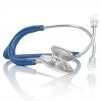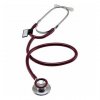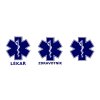"People ask the gods for health, but they do not know that they themselves have power over it." Demokritos (circa 460-370 BC)
Who am I and what is my goal? My name is Lenka Borská. I am a doctor who tries to introduce medical students to how it is possible to increase the years of life spent in health.

I think medicine requires a certain amount of mental exhibitionism. You need to be able to communicate with people, promote your ideas, speak in public and present the results of our work. I have been an extrovert since childhood, when I started looking for fundamental answers to questions about human health. The key question was what happens to my body if I get sick? Why is this and what can I do to maintain my health?
It is therefore not surprising that I started to study medicine and later to work in the field of pathological physiology, which investigates the causes, mechanisms and course of diseases. What fascinated me most about pathophysiology was how everything in the human body is connected to everything else. I knew that when I was educated enough in this area, I could start asking students. That's why I started studying the mutual mechanisms that try to maintain the bodily unity "homeostasis" in order to understand them well myself. In the beginning, I spent my days doing self-study and drawing diagrams so that I could then describe to the students as best as possible how the human body works.

When teaching, I tried to look for illustrative examples from human life in order to make my interpretation as close as possible. I used to describe heatstroke as a thermostat in a house broken with a hammer. The immune system functions an an army of well-armed and ill-armed warriors. The causes of autoimmune diseases as a professional school where students learn new knowledge and if they can't do it they have to leave. They have to leave school, but even though they study well, they don't respond adequately to commands. It was a relative pain to describe some forms of cancer, an example would be a football game, in which a new team of players with a completely different "red polka dot" jersey suddenly bursts into the running game and is not willing to obey the local rules. And because I noticed during mutual communication with the students that they were also interested in what I was interested in as a child, how to prevent this negative impact on human health, I began to ask more and more what we do to stay healthy. It was very funny that, for example, students often complained about the connection between studying medicine and increased intestinal gas. And so, during the lesson, we summarized the principles of preventive activities for our own benefit, but also for those around us. Very often, a relatively boring topic became a very funny topic, which interested the students so much that they themselves began to develop and discover new and new pathophysiological mechanisms.
If possible, I started my lecture with questions. What is it? Why is it like this? What does it mean? What do you think about the issue? How will it manifest itself? What could be the cause? And above all, can it be prevented?

Thanks to my unceasing interest in the preventive field, the results soon appeared, and I became 1.1. 2021 as the first director of the Institute of Preventive Medicine at the Faculty of Medicine of the Charles University in Hradec Králové.
The basic task of our institute is to orient medical students to a healthy lifestyle. I see the main idea in strengthening and developing independent logical thinking of students in the field of primary and early secondary prevention. It is necessary to give students the space to actively think about the prevention programs of today. I see great importance in the fact that students realize how to initiate the general public into the secrets of a healthy lifestyle, and especially how to get out of the whole spectrum of misleading advice that is presented today through the media. It is necessary to direct students to the rapidly changing times with quality undergraduate education that does not look only at the past and stereotypes, but can look to the future and think about the trends that will affect medicine in the coming years.
Special research attention of our institute is devoted to the issue of senescence (aging), as a complex process of decrease in the effectiveness of the physiological and biochemical functions of the organism, which results in an increase in the probability of the occurrence and development of diseases. It is generally known that it is always better to invest in prevention than consequences. Therefore, our team is currently working on specific research immunological or biochemical procedures to actively slow down aging. Our collaborators are also experts from the USA, Germany and Britain.
My work is also my hobby. Because I like to travel, I value my profession and the fact that it allows me to get to know new countries and new cultures. In addition to the scientific rink, I also like to test my strength in sports. Golf fascinated me the most. With it, I combine two qualities that are my own - innate competitiveness and love of movement. Being in nature brings me the necessary relaxation. I consider my children to be the main source of life energy, they force me to always be in good shape.
"The physician's task is not only to restore life and to maintain it for a short time, but to protect it from corruption and to bring it to the peak of admirable perfection and beauty. Medicine will only be perfect when it teaches how to strengthen the fragility of the human organism, prevent infections, prevent diseases, and he will perform these acts in such a way that human life may be well-conceived, blissfully and gloriously prolonged to its natural end." Jan Evangelista Purkyně 1787-1869
prof. MD Lenka Borská, Ph.D., Head of the Institute of Preventive Medicine









